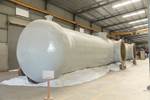ExxonMobil announces licensing agreement to expand GFRP rebar processing tech
ExxonMobil acquires exclusive overseas licensing rights for Neuvokas’ proprietary manufacturing process, expanding to global markets.
ExxonMobil (Houston, Texas, U.S.) has announced a strategic licensing agreement with Neuvokas Corp. (Ahmeek, Mich., U.S.), producer of GatorBar glass fiber-reinforced polymer (GFRP) composite rebar. Under this agreement, ExxonMobil has obtained exclusive rights to sublicense Neuvokas’ proprietary manufacturing process in markets outside of North America (read 2023’s “Gatorbar, NEG, ExxonMobil join forces for composite rebar”). According to ExxonMobil, this collaboration marks a step toward expanding the global market of composite rebar within the concrete reinforcement sector.
ExxonMobil’s Proxxima system’s ultra-low viscosity and snap cure technology, paired with Neuvokas’ innovative process, is reported to enable production speeds up to 20 times faster than traditional composite rebar methods. This process efficiency ultimately builds up GatorBar’s cost-competitiveness to traditional steel rebar.
GatorBar inherently results in corrosion-free, lightweight, long-lasting GFRP rebar while its new Grip technology eliminates slivers common to GFRP competitors. These features further differentiate GatorBar versus traditional steel by delivering reduced transportation costs, simplified handling, faster installation, potential for design optimizations and value across a broad range of projects.
The collaboration highlights both companies’ dedication to driving technology innovation and proving cost-effective solutions for the construction industry.
Related Content
-
Composite wrap system combats corrosion in industrial tank repair
A fiberglass and carbon fiber composite wrap system enabled an Australian nickel mine to quickly repair a stainless steel ammonium sulphate feed tank and protect against future corrosion.
-
Bioabsorbable and degradable glass fibers, compostable composite parts
ABM Composite offers sustainable options and up to a 60% reduction in carbon footprint for glass fiber-reinforced composites.
-
Al Seer Marine, Abu Dhabi Maritime unveil world’s largest 3D-printed boat
Holding the new Guinness World Record at 11.98 meters, the 3D-printed composite water taxi used a CEAD Flexbot to print two hulls in less than 12 days.














